Joe Biden must not let anti-capitalist climate zealots capture his presidency

As the world prepares for the coming Biden administration, a fundamental question looms both for Americans and for the wider world: which Joe Biden will govern as President?
He has long defined himself as a moderate, a centrist, a bipartisan consensus-finder — but recently his Democratic Party has moved significantly to the left, and in order to secure support, Biden’s positions on many issues have moved substantially leftward as well.
Nowhere is this more apparent than on environmental policy.
Some matters are certain. Climate change is happening, we humans are responsible for it, it is a significant problem, and we should do something about it.
However, that scientific consensus has been left behind by many of those surrounding the President-elect and the Democratic Party, in favour of radical Green activism that leans heavily towards anti-capitalist rabble-rousing.
For a sense of what it would mean were Biden forced to adopt this more radical approach as President, it is instructive to look at the tactics already employed by these climate activists.
Harvard’s Naomi Oreskes and Geoffrey Supran have just released their latest attacks against one of their primary targets, ExxonMobil (paper here, Guardian here, original paper here, ExxonMobil’s response here). This is a typical example of how industries are being targeted.
The entire case rests on the claim that some people within ExxonMobil said things that differed from the company’s public statements on climate change. The problem is that it isn’t true. Their research examines what was said by Mobil, then an independent company, and the scientific papers within Exxon, then also independent. The two companies didn’t merge until 1999, but their research traces back to 1977.
Moreover, the contrast between the internal scientific research and the public policy statements are not a matter of objective, scientific truth, but rather the author’s subjective interpretation.
For example, Oreskes and Supran interpret the word “uncertainty” in public statements as “climate denialism”. Their personal bias obviously infects the methodology. Uncertainty is a constant factor in scientific inquiry. The first four reports by the International Panel on Climate Change (IPCC) were based upon the Special Report in Emissions Scenarios which contained 40 — count them, 40 — scenarios for how the future might turn out. Even the current IPCC deliberations look at four different Representative Concentration Pathway (RCP) models of that future.
As William Nordhaus won the Nobel for saying, as the Stern Review recommends, as 90 per cent of polled economists agree, what is needed to tackle climate change is not more reports from activist academics; what is needed is a carbon tax. Which might well be why ExxonMobil follows the science and supports a carbon tax, and includes it in its own internal models.
But in the rhetorical games played by Oreskes and Supran and others in that world, a corporate villain is required and the claims of villainy must be cloaked in the language of scientific certainty, no matter how unscientific the method. For their “content analysis study” of ExxonMobil documents, they cite and claim to use the methods of a social scientist, Professor Kimberly Neuendorf, who wrote the leading book in the field of content analysis. Yet a reviewby Professor Neuendorf herself describes their work as “unreliable, invalid, biased” and more.
The obsession of wild-eyed zealots to find a corporate enemy to scapegoat with claims of secret knowledge and public lies is all designed to distract from the reality that we are all responsible for climate change.
We like to travel, cook our food, and heat our homes with energy from fossil fuels. We are responsible for rising carbon emissions. We like the things fossil fuels enable us to have, and we don’t pay enough attention to the downsides. Energy companies respond to what the market demands. They don’t force us to desire inexpensive and convenient energy, nor to ignore the long-term environmental costs of our having it. We do that ourselves.
Human beings are responsible for the effects of their energy consumption — not those we tempt into supplying them by offering our cash. And to truly tackle climate change, we need to accept that economic reality.
President-elect Biden has pledged to be a global leader on climate issues: that surely will be welcomed across the UK political spectrum. At the same time, we must hope that this leadership is conducted by the moderate centrist Biden of decades past, and is not influenced by the siren voices of zealotry circling around him today.
Main image credit